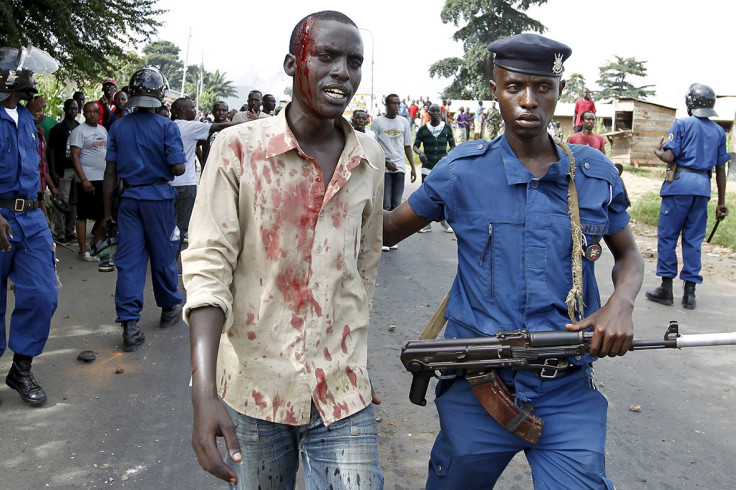President Nkurunziza third term bid 'leading Burundi towards darkness' as civil war looms

The decision by Burundi's constitutional court to approve President Pierre Nkurunziza's controversial third-term bid on Tuesday 5 May has given the go-ahead for a new civil war in the central African country, say leaders of a Burundian advocacy group.
In power since 2005, Nkurunziza, a former rebel leader from the majority Hutu tribe, came under international pressure to withdraw from the 26 June presidential poll, in the country where a 13-year civil war between Tutsis and Hutus ended only in 2006 after the deaths of an estimated 300,000 people.
According to the 2000 Arusha Peace Agreement, which paved the way for democracy and ended the civil war, Burundi's president can only run for two terms.
Nkurunziza's supporters, however, argue that the president's first term should not be counted as he was chosen by the Parliament, not directly by the people as the constitution specifies.
"The court's decision is a betrayal. There was no need for Peter [Pierre] Nkurunziza to use our constitutional court to decide whether he is going to get the third term because the court is full of his people. Who decides in Burundi? It's Peter," the president of the United Kingdom Burundian Diaspora, Fred Ngamiye, told IBTimes UK.
'Leading Burundi into darkness'
Opposed to the president's third term, Ngamiye is accusing Nkurunziza's party, the National Council for the Defense of Democracy (CNDD-FDD), of leading Burundi "towards darkness", as he believes the constitutional court's decision is paving the way for Burundi to "fall into civil war".
This, he claims, is because ethnicity is being used as "an excuse, a weapon to mobilise the majority". In the last month, nearly 40,000 refugees have fled Burundi to neighboring Rwanda, Tanzania and the Democratic Republic of the Congo.
The ruling party is trying to fuel ethnic tension between brothers and sisters. It's divide and conquer, and the result will be absolutely devastating
The president's party is accused of trying to shift the spotlight on to ethnic rivalries by saying that the protesters are only from the Tutsi tribe.
"But that is not true. This is everyone. All ethnic groups are on the streets from 6 o'clock in the morning until 8 at night, Hutus and Tutsis together," Ngamiye said.
"What the ruling party is trying to do now is saying: 'You Hutus don't follow these Tutsis, they are not your brothers and don't want you to live in this country'. They are trying to fuel ethnic tension between brothers and sisters. It's divide and conquer, and the result will be absolutely devastating."
According to Ngamiye, the political manoeuvre is starting to pay, as he believes the "threatened" Hutu majority may be led to "plan to do the unthinkable that happened in 1993 [when ethnic conflict lead to genocide]".
He explained: "We are heading towards hell because of unwise political decisions from CNDD-FDD. I'm very scared about it and the majority of Burundians are scared too."
Protesters: 'Death or victory'
The 40-year-old, who comes from the Burundian capital of Bujumbura, believes the street violence is not going to stop either.
"Whatever is happening in Burundi, if people decided to go in the streets and demonstrate every single day, get beaten and shot by police, it's because they believe in their freedom of speech, democracy and they don't want anyone despite his or hers position in the country to stamp on their democratic values."
There can only be two exits possible, Burundi's protesters say: death or victory.
"I don't see this stopping, because when these people decide to go on the streets, they will only give up their protest once they are finished: dead or victorious. So I don't see a free election happening any time soon."
International community silence
The United Kingdom and the United States both came forward, slamming Nkurunziza's decision to stand for a third term and asked him to revoke his decision.
The rest of the international community meanwhile is remaining silent, Ngamiye says.
"The European Union is not saying anything. China and Russia are trying to give the rest of the world lessons, claiming the US and the UK shouldn't get involved in other people's businesses. But it's not other people's businesses, it's about saving the lives of our people, and democracy."
Ngamiye is calling for the EU, a major donor to Burundi, as well as the entire international community to stand clear and demand that the president withdraws his candidacy.
"The EU has not done it so far because politics is politics, and it has been using a very weak diplomatic language by saying that both parties should sit down and resolve their differences. That's not the way to do it."
© Copyright IBTimes 2024. All rights reserved.






